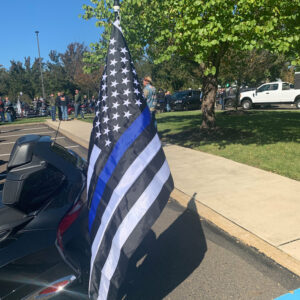Thin Blue Line flags are legally okay on Springfield Township’s property, a federal judge said Monday, overriding a ban that critics say was put in place in the name of political correctness.
The Springfield Township Board of Commissioners voted 5-2 last January to approve a resolution banning the “thin blue line on an American flag” that the township’s Police Benevolent Association (PBA) has adopted as a symbol. Critics call the image, widely used at public events to honor fallen police officers, a “symbol of white supremacy.”
Commissioner Peter Wilson, who supported the ban, said, “These symbols cannot be allowed to exist if they cause offense to anyone in our community.” Commissioner Eddie Graham said, “I think it’s a small step in making this community come together.”
But on Monday, U.S. District Judge Karen Marston declared the ban unconstitutional.
“The Township has not, and indeed, cannot, contest that the Resolution is a viewpoint regulation—it prohibits employees, agents, and consultants from displaying only the Thin Blue Line American Flag, not from displaying flags or political speech generally,” Marston wrote. “Instead, the Township argues that the Resolution is a permissible restriction on employee speech even though it targets a specific viewpoint. Given the Supreme Court’s consistent assertion that viewpoint discrimination is inherently suspect, the Court questions whether the government can ever permissibly regulate employee speech based on viewpoint.”
Marton called the law “particularly egregious” because it was extremely broad. “[T]he Resolution is not limited to displays of the Flag by Township employees while they are at work…Section One prohibits the Flag’s display while an employee is off duty but representing the Township in any way.” (Emphasis original.)
“Even viewing the admissible evidence in the light most favorable to the Township, the Resolution is an unconstitutional restriction on employee speech,” Marston ruled.
Plaintiff’s attorney, Wally Zimolong, celebrated the ruling.
“This is a resounding win for the First Amendment and law enforcement,” Zimolong told DVJournal. He represented the Pennsylvania State Lodge Fraternal Order of Police, Springfield Township Police Benevolent Association (PBA), and three Springfield officers in the federal lawsuit over the ordinance. “We were honored to represent the plaintiffs who put their lives on the line every day to protect ours. The government can never censor speech it finds disagreeable or offensive.”
PBA members adopted a version of the Thin Blue Line flag as its logo in 2021. Court documents noted the flag was never publicly displayed at Springfield Police Headquarters. It was on a bulletin board showing patching from other police departments. Several flags hung up on walls away from the public’s view, on a recycling bin, and on challenge coins put on officers’ desks.
Opponents complained to Township commissioners that the logo made members of racial minorities uncomfortable. Commissioners unsuccessfully lobbied the PBA to change the logo several times last year. That included sending the PBA a cease and desist letter signed by Township Solicitor James Garrity and Manager A. Michael Taylor.
The black-and-blue flag “has been at the center of the controversy between minority communities and law enforcement officials across the country,” Garrity and Taylor argued. “For many members of the Springfield Township community, the utilization of the ‘Blue Lives Matter’ Flag unnecessarily exacerbates the ongoing conflict between police officers and the communities they serve.”
When the ban was first proposed, local residents raised the issue of free speech in the township.
“If someone comes down to the park and all of a sudden you have 50 people wearing this emblem… what’s going to happen?” asked former township commissioner Jim Dailey. “Are you going to shut down the event?”
“I care about everybody, whether I agree with them or not, being able to express themselves however they want,” added Dailey. “And I may find some things very offensive, but somebody still has a constitutional right to display or wear it.”
Township commissioners passed an ordinance in January banning the flag from being displayed on town property or on police uniforms. Officers were told they also had to cover up Thin Blue Line tattoos while on duty.
The ban was only in place for a little over two weeks before Garrity said it wouldn’t be enforced.
Now, it has been completely thrown out. Zimolong is confident the ruling will prevent other municipalities from considering a Thin Blue Line ban. “We hope this case puts other would-be government censors on notice that if you engage in viewpoint discrimination, you will be sued, and you will lose.”

